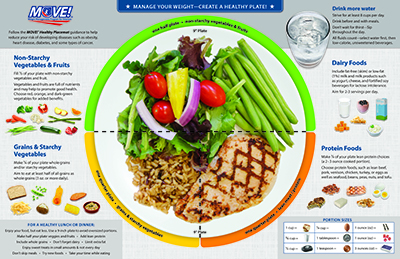Attention A T users. To access the menus on this page please perform the following steps.
1. Please switch auto forms mode to off.
2. Hit enter to expand a main menu option (Health, Benefits, etc).
3. To enter and activate the submenu links, hit the down arrow.
You will now be able to tab or arrow up or down through the submenu options to access/activate the submenu links.
Locator
Contact
Search
VA »
Health Care »
National Center for Health Promotion and Disease Prevention
» Healthy Living »
Eat Wisely
National Center for Health Promotion and Disease Prevention
Eat Wisely
Eating wisely is important at every stage of life.
What's Important to Know?
A healthy eating routine can help boost your health now and for years to come. Small changes matter. Look at your current eating routine. Choose one or two changes for better nutrition. For example:
- Follow a healthy dietary pattern that is right for you.
- Choose nutrient-dense food and drink choices that you enjoy, reflect your culture, and fit your budget.
- Focus on nutrient-dense foods and drinks to meet food group needs and stay within appropriate calorie limits. A healthy eating pattern includes:
- Vegetables of all types - dark green, red, and orange in color as well as legumes (beans, peas, and lentils).
- Fruits - especially whole fresh fruits - but they may be canned or frozen too.
- Grains - at least half of which are high fiber whole-grains.
- Dairy - fat-free or low-fat milk, yogurt, and cheese, and/or lactose-free versions and fortified soy alternatives.
- An assortment of protein foods - lean meats, poultry, and eggs; seafood; legumes (beans, peas, lentils); and nuts, seeds, and soy products.
- Oils - vegetable oils and oils in food, such as seafood and nuts
- Limit foods and beverages higher in added sugars, saturated fat, and sodium, and limit alcoholic beverages. For example:
- Added sugars - Consume less than 10% of your daily calories from added sugars. These are sugars and syrups that are added to foods or beverages when they are processed or prepared.
- Saturated fat - Consume less than 10% of your daily calories from saturated fats and avoid trans-fats.
- Sodium - Limit to no more than 2,300 mg of sodium per day. Choose foods with little added salt and make meals without salt when possible. Adults with high blood pressure may benefit from limiting to 1,500 mg of sodium per day.
- Alcoholic beverages - Adults of legal drinking age can choose not to drink, or to drink in moderation by limiting to 2 drinks or less in a day for men and 1 drink or less in a day for women and people over age 64. Drinking less is better for health than drinking more. Children, pregnant women, and those with certain medical conditions who should not drink any alcohol.
Want to Know More?
If you want to learn more about how to eat wisely, talk with your VA health care team. They can also help if you have questions about making a healthy living change.
Resources
- MOVE! Video Gallery - Find videos on reading food labels, measuring food portions, and planning meals.
- Veterans Health Library: Eat Wisely - View fact sheets and a video that can help you eat wisely.
- VHA Nutrition and Food Services (NFS) Cookbooks - Check out nutrition information by topic, recipes and cookbooks, and resources for food insecurity.
- USDA My Plate - Take the MyPlate Quiz to find out if you’re making every bite count and discover personalized resources to eat healthy. Access recipes and cooking videos to help you build healthy, budget-friendly meals.
- Dietary Guidelines for Americans - Make every bite count with simple tips that set you on a path to healthy eating.





















